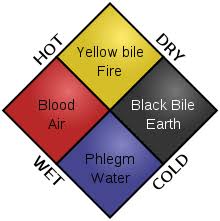Medieval doctors had a sweet gig. No downside, really. Their powers of prediction were pretty much perfect. “You are desperately ill,” a doctor might say. “Undoubtedly, you will soon die from this mortal disease.” And the doctor was usually right on. Sick people had a pronounced tendency to die. What brilliant diagnosticians. “You’re sick. You’re gonna die.” Safe bet.
Because there were no effective medicines half a millennia ago. No antibiotics, no injections, no FMRIs. No clinical trials, no statistics, no double blind studies. No theory of germs, no microscopes, no knowledge of infectious disease. No medical science. No science of medicine. Doctors didn’t know to wash their hands between hovel-calls. To the contrary, leeches and phlegm were cutting edge. “Technology” was not yet a word.

Occasionally of course a patient would recover. “What a brilliant healer I am,” the doctor could exclaim. “You were destined to die but my brilliant regiment has returned you from the gates of Hades.” Like I said, no drawbacks. Doctors were either correct–“you will die”–or saviors: “Well you were gonna die, but everyone agrees I have the best leeches in the village.” (That will be 6.5 million pieces of silver. Checks haven’t been invented yet, but we do take Master Sword.)

An understanding of the actual reasons that people died–bacteria, for example–or lived–they weren’t actually all that sick to begin with–were 500 years in the future. Doctors were free to make inferences and guesses based on the position of the stars in the sky. “Swing a dead cat over your head three times at midnight” was a reasonable prescription. As was appealing to a god who lived in a tree. The understanding that correlation does not imply causality would have to wait several centuries.

I wonder if it would be a stretch to suggest an analogy to some predictions concerning which students were admitted to which colleges this week and why.
“With your grades, scores, extra-curriculars, recommendations, and essays you have no chance, zero, none, nada, zilch of being admitted to that highly selective university,” a college admissions prognosticator might represent. “You were rejected? HA! I knew it!” My model of multiplying your GPA by 400, adding your combined SAT score, then taking the square root of your family income never fails! I knew it! I am never wrong!
And then, when a student was admitted to a highly selective school, our predicto-saurus could intone, “thank goodness you followed my advice and were elected secretary-treasurer of the tuba club.”

Again, a sweet gig: make dour predictions. If the kid is denied, the adult’s insight into the admissions process is evident. If the kid gets in, those 314 hours of service to the nose-picking club must be the reason.
It gets worse: unlike medicine where there is ultimately some rhyme and reason to why some people recover and others die, admissions decisions have much more to do with casinos than they do with cause and effect. A doctor on a medical school admissions committee confided to me recently that they admitted a ping-pong champion. To medical school. Why? Because the kid was a great ping-pong player. Like the scads of other applicants, the ping-pong champ has also gotten a good grade in organic chemistry.
There are now over a dozen colleges that admit fewer than one applicant in ten. If admissions decisions are easy to explain only after the fact–“I knew that student would be denied! Oh, wait a minute. She was admitted? I knew that too!”–focusing on enjoying high school might be the way to go. Just being alive in the middle ages was a thing, an opportunity to be joyous. Similarly being able to go to college–any college–could be considered a wonderful opportunity. Indeed, I think I remember reading somewhere that in life there are no mulligans, that you might as well take a little joy along the way.
Because you just never know when a rejection email or a leech is headed your way.


